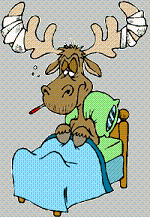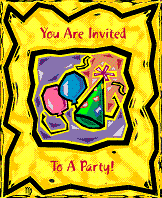
The other day I was watching the movie 'Flavors' with friends (an aside: if you haven't watched the movie yet, do so! Its pretty funny and cool). In one of the scenes, one of the characters explains to an American woman that he can't follow her too well since he speaks and follows only "British English"! How true! When I landed up in the US for the first time, in spite of coming with the tag of "I speak good English", it
was quite an experience interacting with the people here.
I had teamed up with two other future UC Davis students, E and F while coming here. We arrived in at the San Francisco airport and then took the airporter to Davis. We arrived at my apartment about 12.30a at night (yeah, I had
already chosen my apartment and apartment-mates from India). The apartment manager was fortunately still up and helped us with our suitcases to my apartment. There, to my dismay, we found that the apartment was locked. Fortunately, we found a note from R (my future roomie) that she was out for a b'day party and would be back soon. Now we had the task of convincing the apartment manager that we weren't trespassers and that our arrival was anticipated.
So E, F and me explained that
I was the 'Archana' mentioned in the note and that R was expecting me and that we would wait for her arrival. The apartment manager listened to us carefully for sometime and finally asked, "Do any of you speak English?" What!?!!! For goodness sake, we
had been speaking in English :-(!
The next shock came when most of the people I spoke to said that I spoke too fast. Again, I was zapped. Whenever I watched American movies back in India, I used to think that all the American actors spoke way too fast and here they were accusing
me of speaking too fast. Anyways, I slowed down a bit. Now, I had the pleasure of watching all the people staring intently at my lips while I spoke. They were basically trying to lip-read to comprehend what I was saying! Yikes!
Next came the pronounciation part. For some reason, whenever I said 'A', people heard it as 'E'. Similarly when I said 'T', people heard 'D'. Of course, I
had to have a first name which has 3 A's in it. So, everytime I spelt out my name out for anyone, they would carefully write down 'ErchEnE'. I still have this problem. So, nowadays, I *always* spell out my name like "My name is Archana. A as in apple, R as in Robert..." and so on. It takes a while to finish spelling out, but at least I no longer get mail addressed to 'Erchene'.
All the above mentioned problems mostly happened with the native English speakers. For the people from other countries, since they themselves had their own brand of accents from their home-country, trying to decipher each other was a fun and mutually-challenging task. But, I soon found there were problems with that too.
UC Davis has a wide diversity among the grad students. However, the undergrad student population is almost completely made up of Americans or second-generation American descendants of non-Americans, especially Chinese. The latter group formed a huge bulk of the undergrad student population. As a Teaching Assistant (TA), I was assigned to teach C to freshers. My co-TA, S, was a fresh-off-the-boat Chinese guy. His English had a thick Chinese accent and I had a hard time understanding him. We both had to take "discussion" classes for the students to discuss homeworks and programming problems.
S's turn to teach came before mine did. I decided to sit through that class to see how he taught (and get tips). When he started teaching the class, I tried really hard to follow him. From what he wrote on the board, I knew he was covering all the essential concepts, but I could not follow much of what he actually spoke out. But, surprise, surprise - the students seemed to be following him. And I gleefully thought, if the students could follow his accented
and broken English, they shouldn't have too much trouble with my accented but
gramatically correct English.
So when I went for my first discussion class and started to teach, I looked around for signs of comprehension. Blank faces stared back from all corners. When the class got over, I was disappointed that I had gotten
far fewer comprehending glances than S had got. I was beginning to doubt my explanation skills when it suddenly struck me. Most of these kids had
Chinese parents. Most probably they were used to hearing a Chinese accent at home. While an Indian accent was a whole new ball game altogether. At the end of that quarter, guess who got the most number "I can't understand her" on their teaching-review?

Slowly though, I began to pick up the rules of speaking English the American way.Don't get me wrong here. For the life of me, I just CANNOT talk with an American accent. The only word I pronounce differently from the time I was in India is 'schedule'. And that's because the word crops up so often in conversations that it is easier to pronounce 'ske-dule' instead of confusing people with the Indian pronounciation. But - I have managed to pick up the intonation, tone and manner of speaking. So, if I speak slowly and enunciate the words clearly and follow the general American speaking pattern, people can understand me.
In UC Davis, by my third quarter, there was not even one "I can't understand her" on my teaching-review (hooray). And now that people could finally follow me, they were struck by the "good" English that I spoke. Not many people knew that, in India, most of us are taught English almost right from the time we get out of the crib. So they thought that it was wonderful that I could speak so fluently so soon after landing in the US ;-)!
Now, at work, again we have people from a whole bunch of countries. I am able to get comfortably by with my English and I no longer have to keep reminding myself to slow down.
Of course, even now, sometimes, I do encounter people who have difficulty understanding what I say. Oh well, sometimes,
I can't understand what the other person is trying to tell either. I guess it all evens out! But at least, no one has since asked me "do you speak English?" after hearing me talk!!
p.s. My experiences trying to understand
others in the USA would make a whole post by itself :-)!
 Too early celebrations I guess. Sunday night a non-stop bout of coughing kept me awake for a couple of hours. Monday morning I went to work, quite sure of the sympathy of people around me when they saw my coughing self. Yeah right. As soon as I settled in my cubicle I heard at least five different people coughing. And then learnt that four other of my colleagues had taken the day off due to being sick with the flu. Hmph. There flew out of the window, all my plans of getting sympathy. On second thoughts, I was at least feeling a little less miserable - with so many people sick with the "bug", it was just a matter of time before I caught it too.
Too early celebrations I guess. Sunday night a non-stop bout of coughing kept me awake for a couple of hours. Monday morning I went to work, quite sure of the sympathy of people around me when they saw my coughing self. Yeah right. As soon as I settled in my cubicle I heard at least five different people coughing. And then learnt that four other of my colleagues had taken the day off due to being sick with the flu. Hmph. There flew out of the window, all my plans of getting sympathy. On second thoughts, I was at least feeling a little less miserable - with so many people sick with the "bug", it was just a matter of time before I caught it too.







